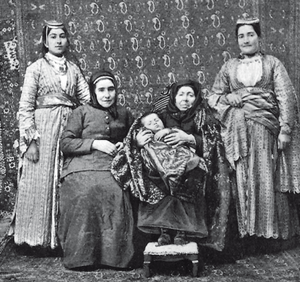Generation facts for kids
A generation is a term with a few different meanings. Most often, it means the average amount of time between when parents are born and when their children are born. This time is usually about 20 to 30 years.
It can also mean all the people who are at the same level in a family tree. For example, you, your brothers, sisters, and cousins are all part of the same generation in your family.
Sometimes, "generation" is used to describe a series of products, like a new model of a car or a video game console. Each new version is called a new generation.
Contents
What is a Generation?
The word "generation" comes from the Latin word generare, which means "to beget" or "to produce." It helps us understand how people are connected through time.
Generations in Families
In a family, a generation is a step in the line of descent.
- Your grandparents are one generation.
- Your parents, aunts, and uncles are the next generation.
- You, your siblings, and your cousins are the generation after that.
This way of thinking helps us see how families grow and change over many years. It shows the link between ancestors and their descendants.
Generations as a Time Period
When we talk about a generation as a period of time, we mean the average time it takes for children to grow up and have their own children. This period is usually around 20 to 30 years.
For example, if your parents were born in the 1980s and you were born in the 2000s, there's about a 20-year gap. This gap represents one generation. This idea is important in demographics, which is the study of populations.
Generations of Products
The term "generation" is also used outside of families and people.
- Think about video game consoles. The PlayStation 1 was the first generation. The PlayStation 2 was the second, and so on.
- Cars often have new "generations" when they get a major redesign. Each new generation brings new features and improvements.
- This use of "generation" helps us track the progress and development of technology or products over time.
Cultural Generations
Sometimes, "generation" refers to a group of people born around the same time who share similar experiences. These experiences can include major historical events, popular culture, and technological changes.
For example, people who grew up during the rise of the internet might have different experiences than those who grew up before it. These shared experiences can shape their values, beliefs, and ways of life.
Some well-known cultural generations include:
- Baby Boomers: Born roughly between 1946 and 1964, after World War II.
- Generation X: Born roughly between 1965 and 1980.
- Millennials (Generation Y): Born roughly between 1981 and 1996.
- Generation Z: Born roughly between 1997 and 2012.
- Generation Alpha: Born from the early 2010s to the mid-2020s.
These groups are often studied to understand social trends and how different age groups interact with the world.
Images for kids
-
Three generations of an Eastern Orthodox priest family from Jerusalem, circa 1893
See also
 In Spanish: Generación para niños
In Spanish: Generación para niños
 | DeHart Hubbard |
 | Wilma Rudolph |
 | Jesse Owens |
 | Jackie Joyner-Kersee |
 | Major Taylor |




